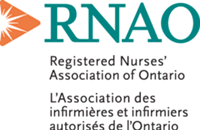Nurses say Ontario election must focus on improving health for all
TORONTO, Feb. 22, 2018 /CNW/ - The political parties that hope to form the next provincial government should adopt policy platforms that improve the health of all Ontarians.
That's the central message delivered by more than 130 registered nurses (RN), nurse practitioners (NP) and nursing students at Queen's Park Thursday. Their challenge to Ontario political parties is contained in a policy platform called Improving health for all, which was released during the Registered Nurses' Association of Ontario's (RNAO) 18th-annual Queen's Park Day. It contains 24 recommendations in five key areas: access to nursing care, health system transformation, living standards, the environment, and government fiscal capacity.
"The day-to-day work of nurses provides us with a window to the impact policies can have on people's lives," says RNAO's President Carol Timmings. "We know what helps keep people healthy and what leads to illness. We also know the health system inside and out, and know how we can make it function better for all Ontarians."
Timmings says improving access to nursing services is key to a better functioning health system, which must be anchored in primary care. To achieve that goal, RNAO recommends that care co-ordinators – most of whom are RNs – be located in primary care settings across the province. To improve health outcomes and prevent complications and unnecessary deaths, it is also imperative that all new hires in teaching and cancer care hospitals be RNs, that RNs handle all first home care visits, and that the proportion of RNs in long-term care be boosted to at least 20 per cent. Currently, regulations stipulate that just a single RN is required in a long-term care home at any given time, which Timmings says is unsafe for residents.
According to Timmings, these changes will improve Ontarians' health outcomes and save dollars. She also highlights how the dangerous, system-wide practice of replacing RNs with less qualified health providers has left Ontario with the lowest RN-to-population ratio in the country, and must be stopped. "The evidence shows that replacing RNs jeopardizes patient safety and doesn't make sense from a health or cost perspective," she says.
In addition to taking better advantage of RNs' knowledge and skills, RNAO wants NPs to bring their advanced expertise to more people across the province. For this to happen, Timmings says the province must lift all the barriers that are still limiting NPs' scope of practice.
Building a more equitable system will also require broader health system changes. While RNAO is pleased that everyone under the age of 25 now has access to essential prescriptions free of charge, the association recommends expanding that access to everyone in the province. "This would make Ontario a leader in our country and would represent an important step towards the establishment of a national pharmacare program, something we have long advocated for," says RNAO Chief Executive Officer Doris Grinspun.
To deliver better health for all Ontarians, Grinspun says reforms must also come in the long-term care sector that will ensure the safety of residents. She says these should include continued support for clinical best practices, and changing funding models so long-term care homes are not penalized when health outcomes of residents improve through the use of evidence-based guidelines.
Grinspun says it is high time that political parties move from discourse to policy when it comes to the needs of Indigenous communities. "For decades, successive governments have taken a colonial style approach to Indigenous people. This must urgently change," says Grinspun, pointing out that "a disproportionate number of Indigenous families lack access to clean water and adequate housing, and Indigenous communities experience the highest child and youth suicide rates in the province."
Social and environmental factors affect everyone's health, and so RNAO recommends earmarking funding for affordable and accessible housing, a province-wide plan to address homelessness, and a guarantee that the minimum wage will be increased to $15 next January. When it comes to the environment, the association says a carbon pricing system is essential to progress towards the targets for greenhouse gas reduction. Dedicated funding for transit expansion and to encourage more active forms of transportation would also reduce traffic congestion and lengthy commuting times, Grinspun says.
To help pay for these priorities, RNAO's platform recommends implementing a more progressive tax system, and making polluters pay fully for the pollution they create.
"We are less than four months away from a significant moment in this province's future," says Grinspun. "With this policy platform, nurses aim to put health, health care and nursing on the political agenda, and to ensure that future policies build a healthier Ontario for all its residents."
For more information about RNAO's platform visit RNAO.ca/improvinghealthforall
The Registered Nurses' Association of Ontario (RNAO) is the professional association representing registered nurses, nurse practitioners, and nursing students in Ontario. Since 1925, RNAO has advocated for healthy public policy, promoted excellence in nursing practice, increased nurses' contribution to shaping the health-care system, and influenced decisions that affect nurses and the public they serve. For more information about RNAO, visit our website at RNAO.ca or follow us on Facebook and Twitter.
SOURCE Registered Nurses' Association of Ontario

or to arrange an interview with a nurse, please contact: Marion Zych, Director of Communications, RNAO, Phone: 416-408-5605, Cellular: 647-406-5605, Toll free: 1-800-268-7199 ext. 209, [email protected]; Daniel Punch, Senior Communications Officer/Writer, Phone: 416-408-5606, Toll free: 1-800-268-7199 ext. 250, [email protected]

Share this article